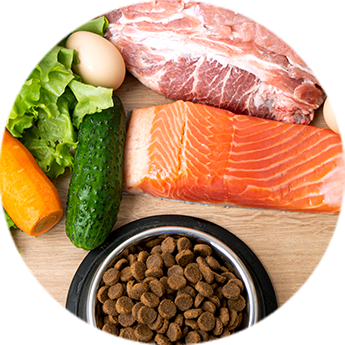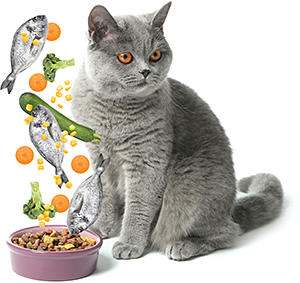Nutrition

Nourishing Your Cat
To live a long, healthy life, your cat needs proper nutrition.
Cats are obligate carnivores, which means that they rely on nutrients found only in animal products. Cats evolved as hunters that consume prey that contains high amounts of protein, moderate amounts of fat, and a minimal amount of carbohydrates, and their diet still requires these general proportions today. Cats also require more than a dozen other nutrients, including vitamins, minerals, fatty acids, and amino acids. Cats should also have access to clean, fresh water at all times.
Basic Feeding & Hydrating Guidance
We recommend purchasing high-quality, brand-name kitten or cat food. Your veterinarian will be able to assess your cat or kitten and determine the best diet. Factors such as age, activity level and health make a difference in what and how much a cat should eat.
- The food you choose should be balanced for the life stage of your cat or kitten.
- All cats require taurine, an amino acid (found only in animal-based protein) that is important for
normal heart function, vision and reproduction. Properly balanced foods will contain taurine. - You will need to provide fresh, clean water at all times, and wash and refill your cat’s water bowls daily.
- Treats should be no more than 5-10% of the diet.
The ASPCA has provided a list of off-limits foods to ensure we keep our furry friends safe.
Please visit their "People Foods to Avoid Feeding Your Pets" page for further guidance.

Cats are Hunters
To help mimic natural feline feeding behaviors and satisfy that instinct, puzzle feeders can also be used. Puzzle feeders hold food and must be handled by the cat to get the food out, which increases activity, and provides mental and physical stimulation.
Feeding Preferences
What we feed our cats is very important, but an often-overlooked aspect of cat health is how we feed them. Providing the proper environment for feeding will make your cat happier and help them avoid overfeeding or underfeeding.
Understanding Your Cat's Feeding Preferences
On an instinctual level, cats have certain preferences for feeding that should be considered. First, cats prefer to eat multiple small meals throughout the day. Unfortunately, many cats are frequently fed in one location with relatively large volumes of food once or twice a day. Some cats even have food out and available at all times. Both of these can lead to inactivity, obesity, and stress for your cat.
Another consideration you should take when feeding your cat is their preference to eat alone. This can be especially challenging for homes with multiple cats. Forcing cats to eat together can cause anxiety, stress, obesity, and health problems. To reduce these concerns, each cat should have a separate feeding station with distance and visual separation between cats. You can also provide elevated feeding spaces.
